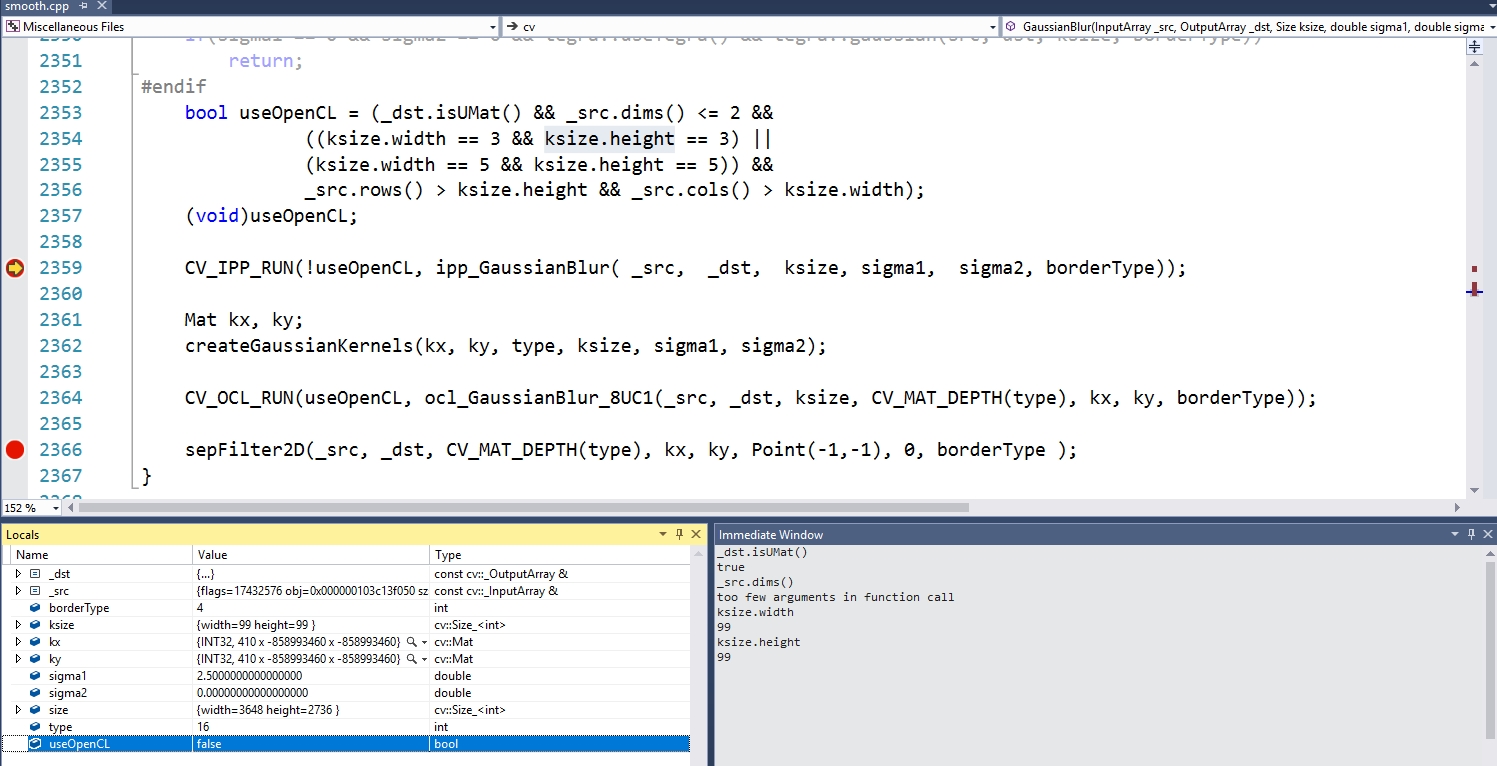GaussianBlur and Canny execution times are much longer on T-API
Hello.
I've just started to learn OpenCV 3. I'm on OS X Yosemite. Here's my clinfo in the GPU part:
Device Name GeForce GT 330M
Device Vendor NVIDIA
Device Vendor ID 0x1022600
Device Version OpenCL 1.0
Driver Version 10.0.31 310.90.10.05b12
Device OpenCL C Version OpenCL C 1.1
Device Type GPU
Device Profile FULL_PROFILE
Max compute units 6
Max clock frequency 1100MHz
Max work item dimensions 3
Max work item sizes 512x512x64
Max work group size 512
Preferred work group size multiple 32
Preferred / native vector sizes
char 1 / 1
short 1 / 1
int 1 / 1
long 1 / 1
half 0 / 0 (n/a)
float 1 / 1
double 0 / 0 (n/a)
Half-precision Floating-point support (n/a)
Single-precision Floating-point support (core)
Denormals No
Infinity and NANs Yes
Round to nearest Yes
Round to zero Yes
Round to infinity Yes
IEEE754-2008 fused multiply-add No
Support is emulated in software No
Correctly-rounded divide and sqrt operations No
Double-precision Floating-point support (n/a)
Address bits 32, Little-Endian
Global memory size 268435456 (256MiB)
Error Correction support No
Max memory allocation 134217728 (128MiB)
Unified memory for Host and Device No
Minimum alignment for any data type 128 bytes
Alignment of base address 1024 bits (128 bytes)
Global Memory cache type None
Image support Yes
Max number of samplers per kernel 16
Max 2D image size 4096x4096 pixels
Max 3D image size 2048x2048x2048 pixels
Max number of read image args 128
Max number of write image args 8
Local memory type Local
Local memory size 16384 (16KiB)
Max constant buffer size 65536 (64KiB)
Max number of constant args 9
Max size of kernel argument 4352 (4.25KiB)
Queue properties
Out-of-order execution No
Profiling Yes
Profiling timer resolution 1000ns
Execution capabilities
Run OpenCL kernels Yes
Run native kernels No
Device Available Yes
Compiler Available Yes
Device Extensions cl_APPLE_SetMemObjectDestructor cl_APPLE_ContextLoggingFunctions cl_APPLE_clut cl_APPLE_query_kernel_names cl_APPLE_gl_sharing cl_khr_gl_event cl_khr_byte_addressable_store cl_khr_global_int32_base_atomics cl_khr_global_int32_extended_atomics cl_khr_local_int32_base_atomics cl_khr_local_int32_extended_atomics
I wrote a little program to test T-API and it turns out that GaussianBlur and Canny take much much longer time to execute on T-API. Here's the code. It loads image and applies these two filter without and with T-API:
double totalTime = 0;
int64 start = getTickCount();
cvtColor(image, gray, COLOR_BGR2GRAY);
double timeMs = (getTickCount() - start) / getTickFrequency() * 1000;
totalTime += timeMs;
cout << "cvtColor ms [" << timeMs<< "]" << endl;
start = getTickCount();
GaussianBlur(gray, gray, Size(7, 7), 1.5);
timeMs = (getTickCount() - start) / getTickFrequency() * 1000;
totalTime += timeMs;
cout << "GaussianBlur ms [" << timeMs<< "]" << endl;
start = getTickCount();
Canny(gray, gray, 0, 50);
timeMs = (getTickCount() - start) / getTickFrequency() * 1000;
totalTime += timeMs;
cout << "Canny ms [" << timeMs<< "]" << endl;
cout << "= Total [" << totalTime << "]" << endl;
// TAPI
cout << endl << "TAPI results" << endl;
totalTime = 0;
UMat uimage;
UMat ugray;
imread(argv[1], CV_LOAD_IMAGE_COLOR).copyTo(uimage);
start = getTickCount();
cvtColor(uimage, ugray, COLOR_BGR2GRAY);
timeMs = (getTickCount() - start) / getTickFrequency() * 1000;
totalTime += timeMs;
cout << "TAPI cvtColor ms [" << timeMs<< "]" << endl;
start = getTickCount();
GaussianBlur(ugray, ugray, Size(7, 7), 1.5);
timeMs = (getTickCount() - start) / getTickFrequency() * 1000;
totalTime += timeMs;
cout << "TAPI GaussianBlur ms [" << timeMs<< "]" << endl;
start = getTickCount();
Canny(ugray, ugray, 0, 50);
timeMs = (getTickCount() - start) / getTickFrequency ...
